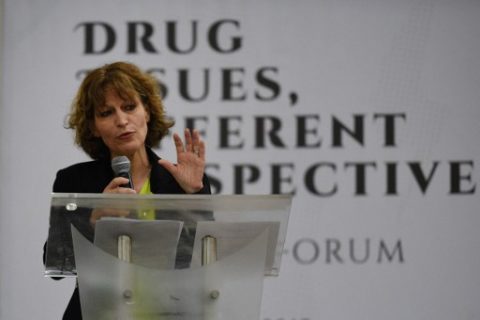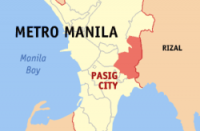
The UN investigator on extrajudicial killings made a surprise visit to the Philippines on May 5, 2017. The Philippine government said it would lodge a complaint with the UN regarding her actions / AFP PHOTO / TED ALJIBE
The United Nations’ special rapporteur on extrajudicial killings has condemned the use of violence to combat illegal drugs, as she made an unofficial visit to the Philippines.
Agnes Callamard had since last year wanted to travel to the Philippines to investigate Philippine president Rodrigo Duterte’s drug war.
In a speech at the University of the Philippines, Callamard warned of the many pitfalls of governments globally adopting violent responses to illegal drugs, and said she had been watching events in the Philippines closely.
“The ‘war on drugs’ does not work,” she said. Callamard praised people in the Philippines who had spoken out against Duterte’s drug war.
“I have followed testimonies of the relatives of victims, I have seen the brave work of civil society actors, lawyers, human rights defenders, academics, senators,” she said.
“I have heard debates between politicians, explanations by government officials, and indeed I have watched footage too of police and military men – and all saying there are other ways, better ways, other options and better options.”
PHL to lodge protest with UN
The government said it had been caught off guard by Callamard’s trip, adding it would lodge a protest with the United Nations because she had not organised the visit through official channels.
“(In) not contacting our government in advance of this visit, she has sent a clear signal that she is not interested in getting an objective perspective on the issues that are the focus of her responsibility,” presidential spokesman Ernesto Abella said in a statement.
But Callamard insisted she had informed Manila of her trip in advance. The government replied “acknowledging (receipt) of my letter and reacting to the information about my upcoming academic trip,” she said in a statement.
Duterte last year invited Callamard to visit the Philippines to investigate the killings, but set strict conditions including a demand that she have a public debate with him on the drug war. Callamard refused to come under those conditions.
She told reporters on Friday that she did not travel to the Philippines to conduct a UN investigation — she said she was merely taking part in the academic forum in a private capacity.
However, she did meet with various human rights campaigners and lawyers while in the Philippines, including some who organised the forum .
The United Nations emphasized Friday that as the special rapporteur on extrajudicial, summary or arbitrary executions, Callamard is an unpaid consultant, and not an employee of the world body.
Duterte was elected last year largely on a law-and-order platform in which he promised to eradicate illegal drugs in the Philippines.
Since then, police have reported killing 2,692 people in anti-drug operations. They say unspecified parties have murdered another 1,847 people in drug-related incidents, while 5,691 other violent deaths are under investigation. The government said 35 police officers and three soldiers have also been killed while prosecuting the drug war.
On the other hand, the Philippine government also reported that more than 1.2 million drug users and pushers have surrendered to the government, and some are now undergoing rehabilitation and treatment, since the war on drugs had started.
Police data also said that 65,000 drug users and pushers have been arrested.
In a major report on the drug war in February, Amnesty International accused police of shooting defenseless people, paying assassins to murder addicts and stealing from those they killed.
Duterte has at times called for drug addicts as well as traffickers to be killed, and vowed to pardon police if they are found guilty of murder for prosecuting the drug war.
But Duterte also repeatedly states that he has not encouraged police to break the law, and he is not doing anything illegal by calling for people to be killed.
Callamard’s visit came as the Philippines was preparing to defend the drug war at a UN Human Rights Council hearing in Geneva on Monday.
The hearing is part of a periodic review that all member countries must be subjected to.
“The Philippines welcomes the… session as an opportunity to highlight the country’s significant and sustained achievements in upholding, promoting and protecting the human rights of every Filipino,” Senator Alan Peter Cayetano, a co-leader of the delegation, said in a statement.
Malacanang said it was standing by its previous statement that questioned Callamard’s professionalism and objectivity.
(reports from Cecille Morella, Agence France Presse, and Eagle News Service)







